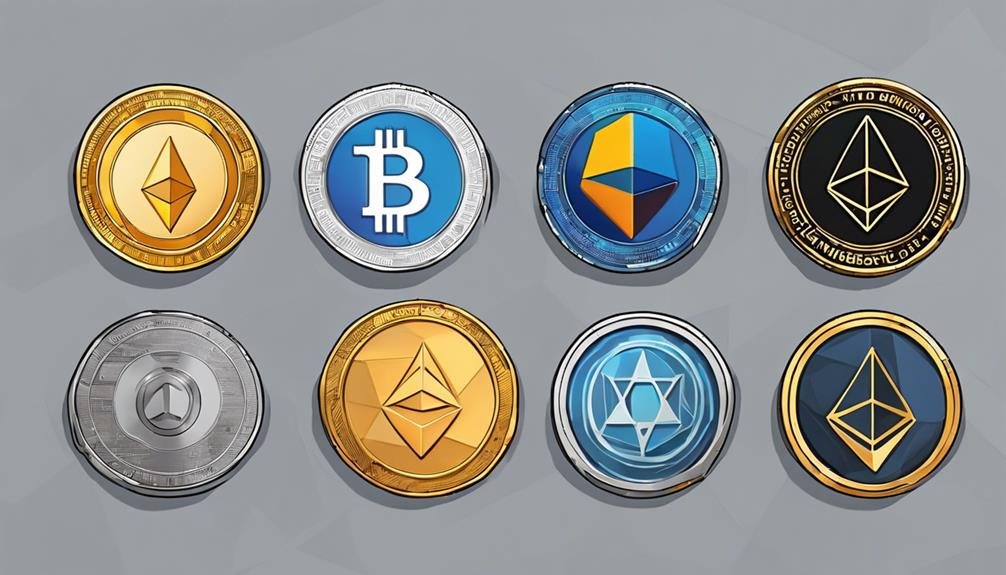If you’ve been curious about exploring alternatives beyond Bitcoin in the cryptocurrency market, you might find it insightful to explore the top 5 contenders. These digital assets bring unique features and potential that could intrigue you. From Ethereum’s smart contract capabilities to Ripple’s swift settlements and low fees, these alternatives offer diverse benefits. Stay tuned to discover how each compares with Bitcoin functionality, popularity, and growth potential.
Table of Contents
Key Takeaways of Top 5 Cryptocurrency Alternatives To Bitcoin Compared
- Ethereum offers programmable smart contracts, unlike Bitcoin, which focuses on transactions.
- Tether serves as a stable trading asset, contrasting Bitcoin’s volatile nature.
- XRP excels in fast, low-cost cross-border payments, diverging from Bitcoin’s primary role.
- Binance Coin (BNB) acts as a utility token within Binance’s ecosystem, distinct from Bitcoin’s store of value function.
Ethereum Vs Bitcoin

When comparing Ethereum to Bitcoin, a notable distinction lies in their fundamental purposes and functionalities within the domain of cryptocurrency. Ethereum, launched in 2015 by Buterin, serves as a platform for smart contracts and decentralized applications, offering a programming language within its blockchain for developers to create diverse applications. In contrast, Bitcoin, introduced in 2009 by an anonymous entity known as Satoshi Nakamoto, primarily functions as a digital currency and store of value.
While Bitcoin focuses on peer-to-peer transactions and monetary value, Ethereum aims to be a programmable platform for various applications beyond currency. Ethereum’s market capitalization is approximately $220.2 billion, positioning it as the second-largest cryptocurrency after Bitcoin, which underlines its significance in digital assets. The differentiation between Ethereum and Bitcoin showcases how each serves distinct roles in cryptocurrencies. Ethereum provides a more versatile and programmable platform than Bitcoin, which focuses on being a digital store of value.
Tether Vs. Bitcoin
Comparing Tether to Bitcoin reveals a contrasting dynamic in the cryptocurrency landscape due to their distinct structures and roles within the market.
- Stablecoin vs. Cryptocurrency: Tether (USDT) operates as a stablecoin pegged to the U.S. dollar, ensuring price stability, while Bitcoin (BTC) functions as a decentralized cryptocurrency.
- Centralized Reserves vs. Decentralization: Tether is centralized, with reserves backing its value, providing stability but raising concerns about transparency. In contrast, Bitcoin operates decentralized without any physical asset backing it.
- Market Cap Disparity: Tether’s market cap sits at approximately $98 billion, notably lower than Bitcoin’s market cap, reflecting Bitcoin’s dominance in the cryptocurrency market.
- Trading Utility: Tether is widely used for trading between cryptocurrencies due to its stable value, providing a reliable medium for traders to hedge against market volatility, whereas Bitcoin retains its position as the leading cryptocurrency, often used for long-term investment and as a store of value.
XRP Vs Bitcoin

XRP and Bitcoin showcase distinct approaches to value transfer and market positioning in cryptocurrencies. XRP, also known as Ripple, focuses on revolutionizing cross-border payments by emphasizing fast and affordable transactions. Unlike Bitcoin’s primary role as a store of value, XRP prioritizes efficient value transmission and settlement processes. With its technology enabling real-time international transfers at minimal fees compared to traditional banking systems, XRP offers a competitive advantage in global transactions.
Another critical differentiator is XRP’s utilization of a unique consensus mechanism, setting it apart from Bitcoin’s proof-of-work system. These distinctions underscore how XRP stands out in cryptocurrency, particularly in facilitating seamless cross-border payments with its efficient and cost-effective approach.
Binance Coin Vs. Bitcoin
XRP’s focus on efficient cross-border payments contrasts with Binance Coin’s utility within the Binance ecosystem, presenting a distinctive comparison to Bitcoin’s role in the cryptocurrency market. Binance Coin (BNB) was created in 2017 by the Binance exchange specifically for use within its ecosystem rather than as a digital currency like Bitcoin. Here are some key points to contemplate when contrasting Binance Coin to Bitcoin:
- Market Capitalization: BNB boasts a market capitalization exceeding $42 billion, solidifying its position as one of the largest cryptocurrencies by market cap.
- Utility Token: Unlike Bitcoin, Binance Coin serves as a utility token, offering various functions within the Binance platform.
- Maximum Supply: With a maximum supply of 194,972,068 coins, BNB’s scarcity contributes to its value proposition within the Binance ecosystem.
- Adoption: Binance Coin has seen significant growth and adoption, with its current price at $316.82 (as of April 2023), showcasing its increasing popularity and utility.
USD Coin Vs Bitcoin

USD Coin (USDC) presents a stable alternative to Bitcoin, offering predictability and reliability in value due to its peg to the U.S. dollar. While Bitcoin is known for its volatility, USDC maintains a 1:1 ratio with USD, making it a popular choice for traders looking to hedge against market fluctuations. USDC’s market capitalization of $43.6 billion underscores its significance in the stablecoin market, providing users with a secure and transparent option for cryptocurrency transactions.
In contrast to Bitcoin, which can experience significant price swings, USDC’s stable value makes it a preferred asset for those seeking a more predictable trading experience. Additionally, USDC’s backing policy ensures that each token is backed by an equivalent amount of USD in reserve, adding an extra layer of security for investors. Whether used for trading between cryptocurrencies or as a store of value during turbulent market conditions, USDC stands out as a reliable alternative to Bitcoin for those prioritizing stability in their digital assets.
Frequently Asked Questions
What Crypto Is Most Similar to Bitcoin?
When comparing cryptocurrencies to Bitcoin, Ethereum stands out for its similar blockchain technology and widespread use. Litecoin shares similarities in transaction speed, while Ripple focuses on cross-border payments, adding a distinct touch.
Who Is the Largest Competitor of Bitcoin?
When comparing Bitcoin’s competitors, Ethereum is the largest rival due to its smart contract features. Ripple focuses on fast settlements, Litecoin offers quicker confirmations, Cardano emphasizes security, and Binance Coin connects with utility functions.
Which Crypto Can Beat Bitcoin?
To beat Bitcoin, a cryptocurrency must gain market dominance, address price volatility, boost adoption rates, innovate technologically, navigate regulatory challenges, sway investor sentiment, tackle scalability, enhance privacy, employ decentralized governance, and improve transaction speeds.
Which Coin Is Alternative to Bitcoin?
If you’re looking for an alternative to Bitcoin, Ethereum stands out with smart contract capabilities. Ripple excels in cross-border payments, while Litecoin offers faster confirmations. Cardano aims to rival Ethereum, and Binance Coin serves diverse transactions.
Conclusion
When comparing the top 5 cryptocurrency alternatives to Bitcoin, Ethereum, Ripple, Litecoin, Cardano, and Binance Coin, all offer unique features and advantages. Ethereum’s smart contract capabilities, Ripple’s fast settlements, Litecoin’s transaction efficiency, Cardano’s proof-of-stake platform, and Binance Coin’s association with a major exchange make them solid choices for investors looking beyond Bitcoin. Each alternative has strengths and should be considered based on individual investment goals and preferences.



